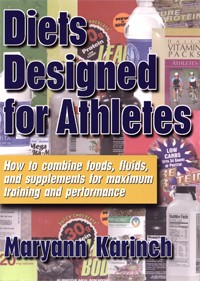|
|
Diets Designed for Athletes
|

|
| Author: |
Karinch M |
| Category: |
Sports Nutrition |
| Audience: |
Elite Athlete |
| Length: |
221 pages |
| Publisher: |
Human Kinetics |
| Year Published: |
2002 |
| List Price: |
$17.95 |
|
|
|
|
AthleteInMe.com®
Rating:

 Worth A Look
Worth A Look
Diets Designed for Athletes is a sports nutrition book written for competitive athletes. Its subtitle is: "How to combine foods, fluids, and supplements for maximum training and performance."
ABOUT THE AUTHOR
According to the bio, the author is an active competitor in endurance and outdoor sports and is a certified personal trainer. She has also competed in powerlifting and bodybuilding events and was a collegiate gymnast. Her college degrees are in speech and drama...hardly what one would expect for an author of a sports nutrition text.
CONTENT
The chapters are divided into:
- Chapter 1: Using Performance-Enhancing Foods
- Chapter 2: Eating For Energy
- Chapter 3: Aiding Recovery
- Chapter 4: Supplementing For Strength
- Chapter 5: Adding Endurance
- Chapter 6: Gaining or Cutting Weight
- Chapter 7: Handling Extreme Conditions
- Chapter 8: Fueling to Suit Your Age
- Chapter 9: Refueling During Competition
- Chapter 10: Recharging and Replenishing
The layout is nice and clean. There are plenty of tables and black and white photos.
The book is not intended to be an academic text, so specific statements in the text are not referenced back to the original citation. This is unfortunate since some statements are dubious, or, conflict with recommendations from other sources.
For example, in Chapter 6, the author offers a formula for "gaining lean mass". The total calories to be consumed (per day) is arrived at by the nebulous formula [(wt. in lbs)(20)] + 1000. This makes no sense since the person's activity level (ie., daily calorie expenditure) is not considered.
On the same page, the author recommends a daily protein intake of 1 g per pound of body weight (or, in metric expression, 2.2 g protein per kg body weight). This is substantially higher than the 1.2-1.8 g/kg recommendation for protein intake seen elsewhere.
DISCUSSION OF SUPPLEMENTS
This book discusses sports supplements quite a bit....too much, in my opinion. In Chapter 6, an athlete named "Moe" is profiled who takes androstenedione, androstenediol, creatine, DHEA, nor-androstenedione, nor-androstenediol, "joint" supplements, "a weight gainer", and even ZMA, the supplement that put BALCO labs on the map. This chapter also offers extensive tables of "weight gainers" products, prohormones (with recommended dosages), and "herbal stimulants". Chapter 8 profiles the diet of Bill Misner who, apparently, takes Hammer Gel, 3 different types of E-CAPS, co-enzyme Q-10, Enduro caps, piperine, "a digestive enzyme", rosemary, tumeric, melatonin, and several vitamins and other herbs. The author appears to be presenting this person's formula as an example of what other athletes need to mimic in order to attain a similar level of success.
SUMMARY
The inclusion of so much information on sports supplements, especially when dosages are provided, implies endorsement by the author. This is unfortunate, since it seriously undermines the author's credibility and the other information in the book, which is generally good. Because of that, I cannot recommend this book. If I were a coach, I would keep this book out of the hands of my athletes. Sports nutrition books by Chris Carmichael (Food For Fitness) or Nancy Clark (Sports Nutrition Guidebook) or Ivy and Portman (The Performance Zone) are much better and more credible.
Copyright ©2005 AthleteInMe, LLC. All rights reserved.
| Reviewed by: Stan Reents, PharmD |
6/2/2014 11:05:34 AM |
|
|